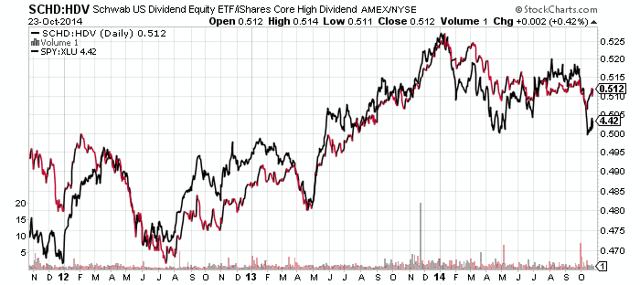Schwab Vanguard lower ETF cost will be next
Post on: 27 Май, 2015 No Comment

Share This Story
(AP Photo/Mary Altaffer, File)
At the end of September, Charles Schwab threw down the gauntlet in the exchange-traded fund arena by lowering the expenses on its 15 ETFs. some to as low as 0.04 percent.
According to a story in Bloomberg, investors in Schwabs U.S. Broad Market and U.S. Large-Cap ETFs will only pay 40 cents a year for every $1,000 they put into those funds. The idea is to attract investors to Schwab with the cheap offering and then keep them with other, more lucrative investment opportunities.
Vanguard answered back this week by changing the benchmarks on 22 of its ETF and index funds. effectively reducing costs for investors as well.
Reducing costs is a great thing for investors. The investor is the one who benefits. In our case, we looked at a comprehensive suite of 100 mutual funds, looking to reduce the cost of all of our funds, said Rodney Comegys, principal in Vanguards equity investment group. It was a bold move for us to change our benchmarks but there was a good reason to make this change, to give [investors] the same chance to get good returns at lower costs.
That said Vanguard is an at-cost organization. When we make a profit, we reduce our expense ratio. We, in aggregate, cant sell products for less than they are worth, but as soon as we had the assets under management, which gave us more scale, we lowered the cost for investors, Comegys said.
Vanguard will transition six international stock index funds, with assets of $170 billion, to FTSE benchmarks, and 16 U.S. stock and balanced index funds, with assets of $367 billion, to new benchmarks developed by the University of Chicagos Center for Research in Security Prices (CRSP).
The indexes from FTSE and CRSP are well constructed, offer comprehensive coverage of their respective markets, and meet Vanguards best practice standards for market benchmarks, said Vanguard Chief Investment Officer Gus Sauter. Equally important, and with our clients best interests in mind, we negotiated licensing agreements for these benchmarks that we expect will enable us to deliver significant value to our index fund and ETF shareholders and lower expense ratios over time.
In an environment in which index licensing fees, in general, have represented a growing portion of the expenses that investors pay to own index funds and ETFs, Sauter noted that the long-term agreements with FTSE and CRSP will provide cost certainty going forward with these two index providers.
Vanguard is the mutual fund industrys only client-owned firm that manages its funds and ETFs at cost, Sauter said. Our structure, along with our ongoing commitment to keep operating costs at the lowest reasonable levels, leads to low expenses that are enduring in nature.
Exchange-traded funds are a great, low-cost investment option for anyone who wants to take advantage of price differentials during a given day. Traditional mutual funds allow investors to trade once a day, but ETFs allow multiple trades in a 24-hour period.

According to Charles Schwab, there is $1 trillion invested in ETFs in the United States. and their flexibility makes them an easy way to build a diverse portfolio. That said the only investors who should seriously consider ETFs are the ones who are willing to do their homework.
Are ETFs lower cost than mutual funds? According to the Schwab website, ETFs do have fewer fees and lower expense ratios, but if an investor makes multiple trades a day, the commissions could add up, making a traditional no-load mutual fund a lower cost option.
The other benefit of ETFs is they allow people to put money into more exotic offerings like real estate, currencies and derivatives, broad stock indexes, stocks from various sectors, industries or regions.
With its recent price cuts, Schwabs ETFs now lead the list of funds with the lowest expense ratios, followed closely by Vanguard, but as Allan Roth of CBS Money Watch points out, ETFs have other expenses besides their expense ratio and if the two companies ETFs are compared on bid-ask spreads, commissions to buy the ETFs, discounts and premiums, Vanguard still has a slight edge on Schwab.
Vanguard has more ETF assets under management, but experts predict that Schwabs lower expense ratios will bring a host of new investors to the company. The next question is who will be next in lowering expenses for investors? Do the top companies in the field who offer ETFS drop their costs to compete with Schwab or continue doing what theyve always done?














